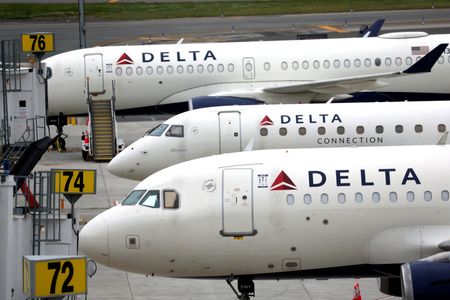By Rajesh Kumar Singh
CHICAGO (Reuters) -Delta Air Lines Inc said on Wednesday its profit is expected to nearly double next year, driven by “robust” travel demand and a decline in non-fuel operating costs.
The Atlanta-based carrier forecast an adjusted profit of $5 to $6 per share for 2023, up from an estimated $3.07 to $3.12 per share for this year.
That is well above analysts’ estimates for profits of $4.80 a share for 2023 and $2.89 in 2022, according to a Refinitiv survey.
“Demand for air travel remains robust as we exit the year,” Chief Executive Ed Bastian said in a statement.
In an investor update, the company also upgraded its profit estimates for the current quarter. It now expects to post an adjusted fourth-quarter profit of $1.35 to $1.40 per share, up from its $1.00 to $1.25 per share forecast issued in October.
Delta narrowed its fourth-quarter revenue forecast and now sees it coming in 7%-8% higher than the same period in 2019. In October, the company estimated fourth-quarter revenue would be 5% to 9% higher versus 2019.
U.S. carriers have been using 2019, before the pandemic, as the benchmark for their performance.
Delta’s shares were up 3% at $34.35 in morning trade.
Citi analyst Stephen Trent called the company’s forecasts “very encouraging”.
Delta’s update comes at a time when a worsening economic outlook coupled with high inflation had sparked concerns about consumer demand. The NYSE Arca Airline index has fallen about 30% this year, compared with a 16% decline in the broader S&P 500 index.
Booming consumer demand, thus far, has helped carriers mitigate higher fuel and labor costs through higher ticket prices. With Delta and other airlines offering big pay raises to pilots, the industry’s labor bill is set to increase.
Airline executives are looking to pass along the increased costs to customers.
However, a 17-year low U.S. personal savings rate as well as mounting job losses have cast a shadow on the travel demand outlook. Any slowdown in consumer spending is expected to undermine airlines’ pricing power.
Carriers have been playing down those concerns. In its investor update, Delta said it expects 15% to 20% year-on-year revenue growth and to generate more than $2 billion in free cash flow next year, enabling further debt reduction.
Non-fuel costs are projected to decline by as much as 7% in 2023 as the company expects to fully restore its network to pre-pandemic level, resulting in a better utilization of its resources.
Meanwhile, a slowing global economy has led to a fall in oil prices, providing some much needed relief to airlines. Jet fuel prices, which have been one of the two biggest operating expenses for carriers, have fallen over 20% in the past month.
Delta also reiterated its goal to generate an adjusted profit of over $7 per share and return to investment grade metrics in 2024.
(Reporting by Rajesh Kumar Singh; Editing by Bill Berkrot, Alexandra Hudson)

